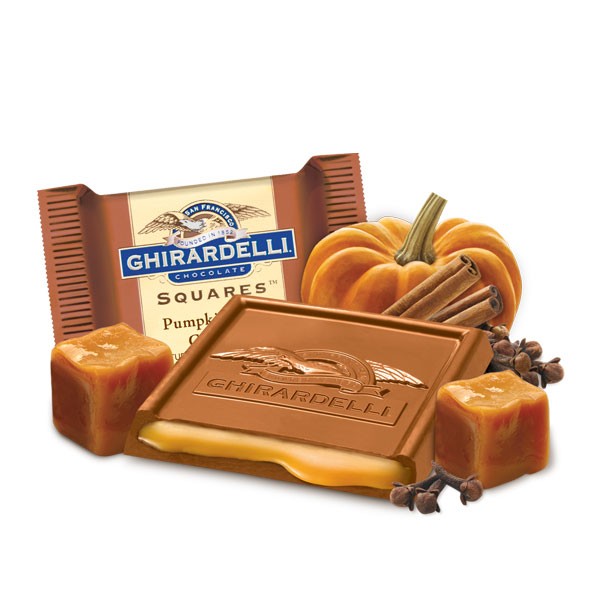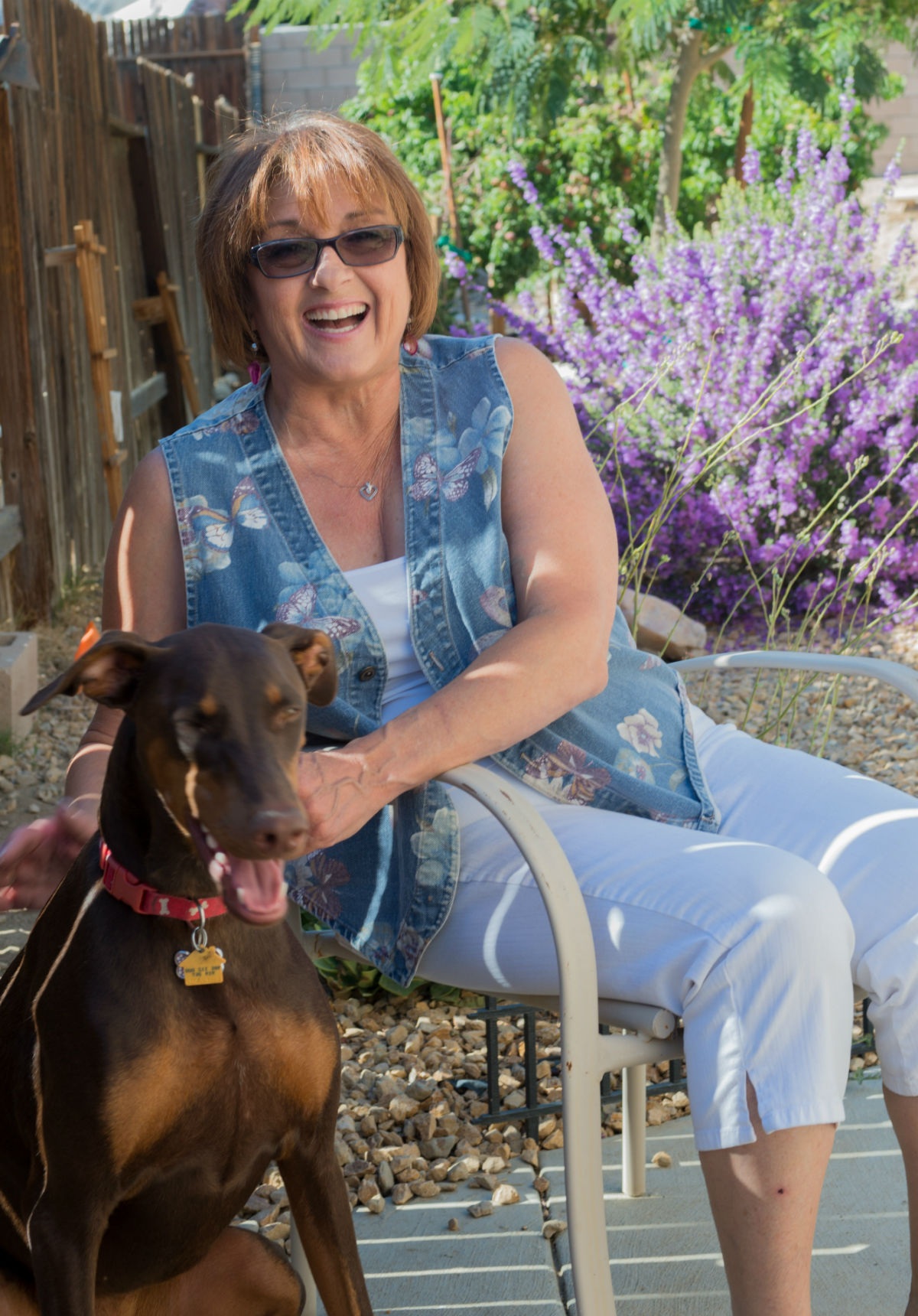September 23, 2014
National Voter Registration Day
Did you know that in 2008, six million Americans didn’t vote because they missed a registration deadline or didn’t know how to register?
We can’t let that happen again – the 2014 election is just too important to working families. This election will determine whether the Senate and countless state and local governments fight to raise the minimum wage and expand workers’ rights or to bust unions, slash budgets, and cut taxes on the rich. We need to make sure that every UFCW household has its voice heard this year.
Can we count on you? Then register today.
Today is National Voter Registration Day, and our allies at Rock the Vote have created a website with all the information you need to make sure you’re registered.
Forms, key dates, and other voting information are all included.
September 23, 2014
It’s Officially Fall! Jump on the Pumpkin-Flavored Bandwagon with Union-Made products!
Although grocery stores have been trying to convince us it’s been fall for weeks now, today marks the official start of fall, or the Autumnal Equinox.
You may have noticed that there’s been a craze for Pumpkin Spice this, and pumpkin-flavored that in stores everywhere–with new pumpkin and fall-flavored or scented products popping up left and right.
Why not embrace the trend by finding union-made stuff? Below, we’ve provided a fun fall list of ideas to help satisfy your pumpkin product cravings:
-Stop in you local Safeway and purchase a Pumpkin Spice Latte from the UFCW Safeway Starbucks baristas! 
-Pick up some union made beer, like Mendocino Pumpkin Ale or Michelob Pumpkin Spice Ale
-Indulge in some seasonal union-made chocolate, like Ghirardelli Pumpkin Spice Caramel Squares, or Hershey’s Candy Corn or Pumpkin Spice kisses
-Use Food Club canned pumpkin (UFCW product) or buy Kroger brand pumpkin puree from 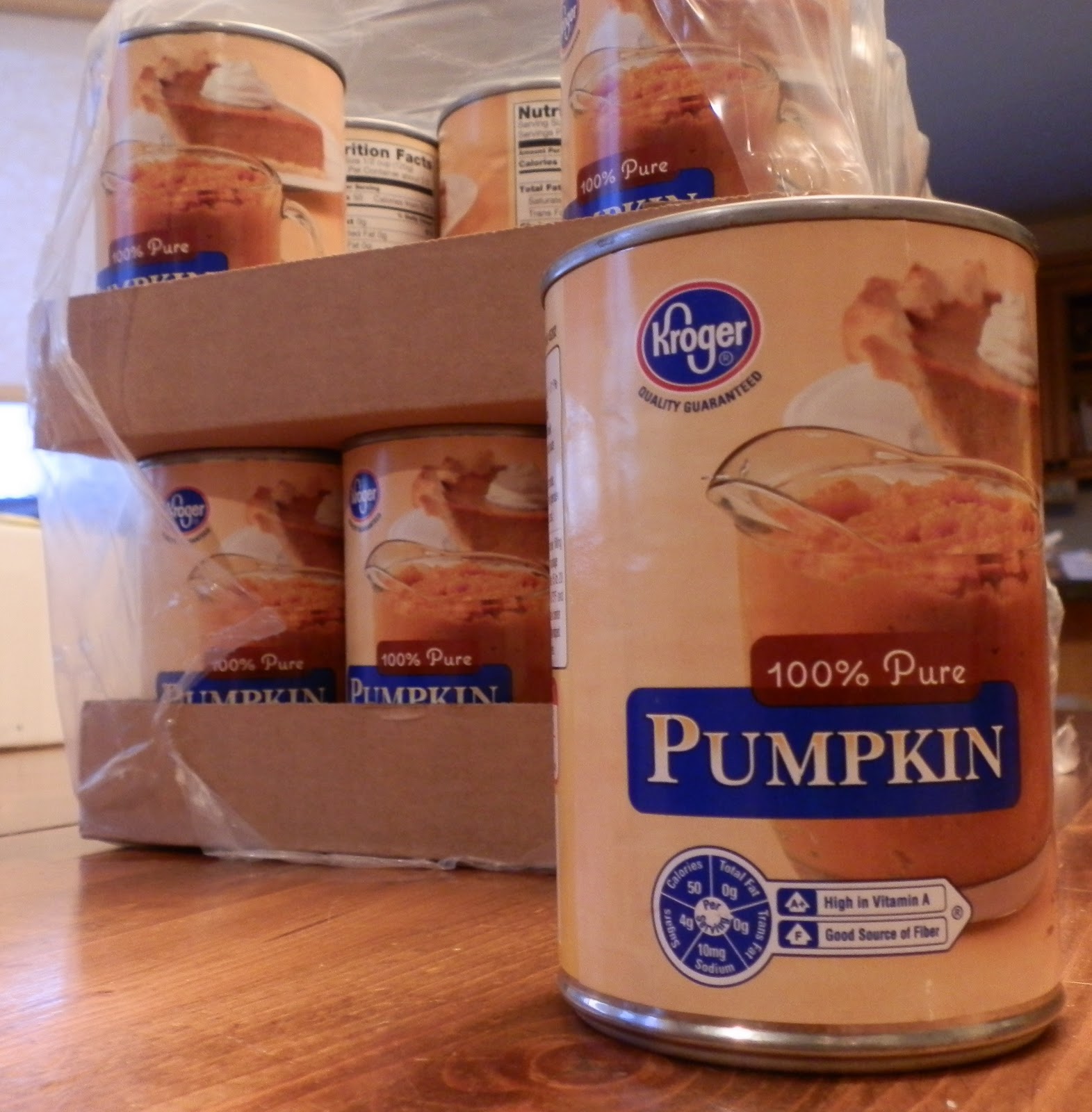 UFCW members at Kroger for all your fall baking needs!
UFCW members at Kroger for all your fall baking needs!
-Relax with some UFCW-made Gonesh Fragrances incense sticks in seasonal scents, like “Spirit of Autumn” or “Halloween” 
-Bake a union-made pumpkin recipe, like Double Layer Pumpkin Cheesecake!
- 2 (8 ounce) packages of Horizon or President Choice cream cheese, softened
- 1/2 cup of Domino Sugar
- 1/2 tsp Kroger or other union lable vanilla extract
- 2 union-label eggs, like Horizon
- 9 in. prepared graham cracker crust from union-label grocery store
- 1/2 cup Kroger brand pumpkin puree
- 1/2 tsp cinnamon
- 1 pinch ground cloves
- 1 pinch ground nutmeg
- 1/2 cup Giant brand or other union-label frozen whipped topping, thawed
Directions
Preheat oven to 325 degrees F (165 degrees C).
1) In a large bowl, combine cream cheese, sugar and vanilla. Beat until smooth. Blend in eggs one at a time. Remove 1 cup of batter and spread into bottom of crust; set aside.
2) Add pumpkin, cinnamon, cloves and nutmeg to the remaining batter and stir gently until well blended. Carefully spread over the batter in the crust.
3) Bake in preheated oven for 35 to 40 minutes, or until center is almost set. Allow to cool, then refrigerate for 3 hours or overnight. Cover with whipped topping before serving.
September 23, 2014
UFCW Members Are Making the News
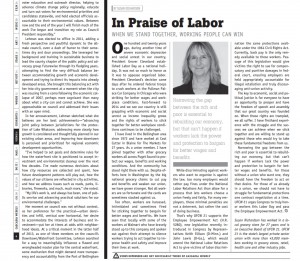
UFCW members like Susan Richardson from UFCW Local 21, are making their voices heard on the opinion pages of newspapers across the country.
UFCW members are making their voices heard on the opinion pages of newspapers across the country. In the past few weeks, UFCW members have had op-eds and a letter to the editor published on topics ranging from Labor Day and the benefits of union membership to the recent Market Basket grocery boycott.
Susan Richardson, a grocery store worker and UFCW Local 21 executive board member, had an op-ed published in the Cascadia Weekly (scroll down to page 6) regarding Labor Day and her support of the Employee Empowerment Act, new legislation that would amend the National Labor Relations Act to give victims of labor discrimination the same protections available under the 1964 Civil Rights Act.
“Narrowing the gap between rich and poor is essential to rebuilding our economy, but that can’t happen if workers lack the power and protection to bargain for better wages and benefits.”
Michael Pajewski, a member of UFCW Local 23, had a letter to the editor published in the Pittsburgh Post-Gazette regarding Labor Day and how all workers have benefited from unions.
“Whether you are a union worker or not, you have enjoyed the benefits of union negotiations: the 40-hour work week, holiday pay, vacation time, overtime pay and safety standards where you work.”
And Jeff Goldhaber, a Stop & Shop worker and UFCW Local 1445 shop steward, had an op-ed published in Labor Notes regarding Market Basket workers and the benefits of having a union voice on the job.
“Customers boycotted Market Basket not because of loyalty to a CEO they’ve never met. They boycotted because they wanted to support the store workers they know and preserve the community that’s been built up around these stores. If we really want to save Market Basket, we need to address the workers’ concerns.”
These are just a few examples of how UFCW members are making their voices heard in their local newspapers. We look forward to highlighting additional op-eds and letters to the editor by UFCW members throughout the year.
September 18, 2014
Hispanic Heritage Month Spotlight: An Interview with Esther R. Lopez, International Vice President and Director of the UFCW’s Civil Rights and Community Action Department
 As part of the our ongoing celebration of Hispanic Heritage month, we sat down with UFCW International Vice President and Director of the Civil Rights and Community Action Department Esther Lopez to talk about the important relationship of the Labor movement and the achievements and contributions made by Hispanics.
As part of the our ongoing celebration of Hispanic Heritage month, we sat down with UFCW International Vice President and Director of the Civil Rights and Community Action Department Esther Lopez to talk about the important relationship of the Labor movement and the achievements and contributions made by Hispanics.
What does your Hispanic Heritage Month mean to you?
There are nearly 53 million Hispanics in America. It is an opportunity to acknowledge, affirm and celebrate the contributions of Hispanic communities across America. One of my favorite quotes is “diversity is a blessing not a burden,” and Hispanic Heritage Month is a celebration of diversity.
How and why did you become involved with the labor movement?
If you have a vision for a future of opportunity and hope, then you see a future where all workers can join a union. Unions are the difference between working families that thrive and working families that merely survive. Unions are especially critical to Hispanic workers – workers earn more, are more likely to have health insurance, and less likely to get injured on the job. Unions are essential to our future progress.
I connected with the labor movement as a volunteer in high school. We were working to register and move Hispanic voters to the polls. Because I was bilingual, I did phone banking. There was no turning back.
Immigration reform is an important issue for the Hispanic community. What is the Civil Rights and Community Action Department doing in terms of helping workers get started on the pathway to civic participation and citizenship in preparation for the passage of a comprehensive immigration reform bill?
Nearly 9 million individuals are eligible to apply for U.S. citizenship. The Union Citizen Action Network (UCAN) is a program to assist legal permanent residents to become U.S. citizens. We are training members, stewards, union staff, and community and faith allies to assist UFCW members to apply for naturalization. We are expanding access to affordable legal services by building strong partnerships with affordable legal providers.
Our goal is for UFCW members to see our union as the first place to get accurate and timely information about immigration issues. I believe the workplace is the space where immigrant and refugees become fully integrated into our overall community.
As one of the highest ranking Hispanic leaders at the UFCW, what suggestions do you have for other Hispanics who want to become more involved in the labor movement?
Hispanic workers are the fastest growing sector of the workforce, and Hispanic members are over 25% of our union. We have a very special responsibility to grow the labor movement and to grow our union. There is something profoundly powerful about workers coming together to make decisions about their workplace. In short, it means we become active members of our union.
How would you say union membership helps to narrow the income and equality gap—something that disproportionately affects Latinos and other minorities?
The evidence is indisputable. If you are a member of a union, you earn more, have better benefits and more job stability. Low-wage, non-union jobs are a sentence to poverty – and this is why we have to talk about the difference between union jobs and non-union jobs at our dinner tables and churches and to politicians and community leaders. More importantly, we have to organize workers.
Finally, why is Hispanic Heritage Month so important to you and do you have any favorite union-made Hispanic heritage family recipes that you would like to share?
Let’s celebrate diversity in the workplace. I invite UFCW members to use Hispanic Heritage Month to create opportunities to share our racial, ethnic and cultural richness with their coworkers. Organize an event where we can learn and share history and culture with each other. Invite coworkers to community events.
And all cultures have their version of “fried dough” – and let’s face it – it is delicious. So here goes mine. We call them “sopapillas” (so-pa-pi-yas).
Union Made Sopapillas
1 pkg Red Star dry yeast
1/4 cup warm water
3/4 cup milk (plenty of union-made choices, like President Choice)
4 tbsp Domino sugar
1 tbsp Morton salt
2 tbsp Land O’Lakes butter
3 c Gold Medal flour
About 2 inches of any cooking oil, like La Preferida
Soften yeast – set it aside.
Combine milk, sugar and salt – bring to boil
Remove from heat – stir in butter – cool to lukewarm.
Stir in beaten egg, add yeast, gradually add flour,
Cover dough with cloth – allow to rise to about double in size – about an hour.
On floured board knead until dough is smooth,
Let rest for 15 minutes.
Roll to about nearly 1/2 inch and cut into 2 inch squares,
Heat oil to about 350 – make sure oil is nice and hot.
Cook sopapillas a few at a time – browning on one side and turning once. They will puff up.
Drain and serve with honey or powdered sugar. I like honey.
To share your own stories of Labor and Hispanic heritage, or your favorite union-made recipes, hit us up on facebook or tell us here: http://www.ufcw.org/resources/members/share-your-story/
September 15, 2014
UFCW Celebrates Hispanic Heritage Month
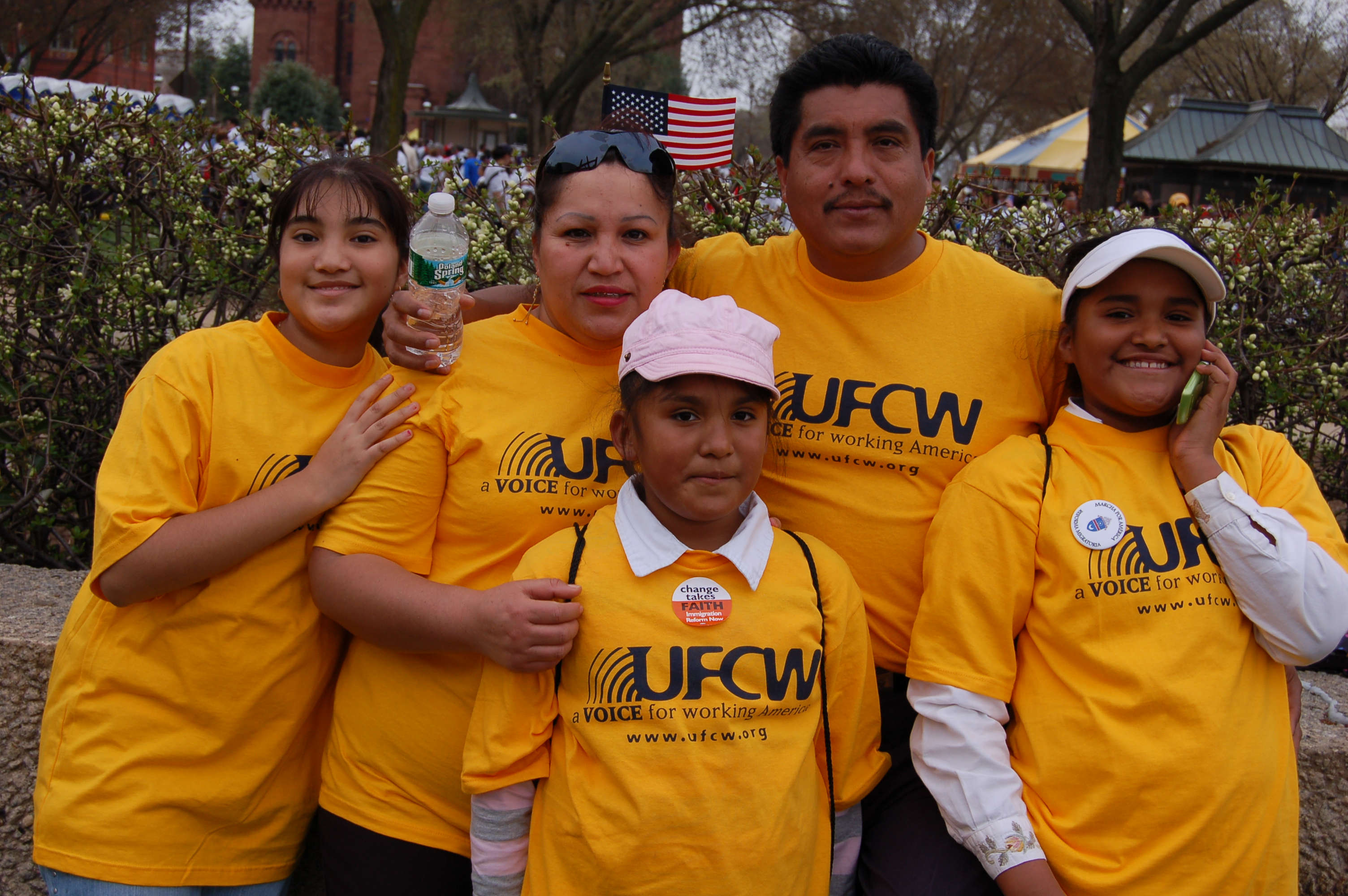 September 15 marks the beginning of Hispanic Heritage Month—a time for the UFCW to pay tribute to Hispanic Americans and their positive contributions to our communities and our country.
September 15 marks the beginning of Hispanic Heritage Month—a time for the UFCW to pay tribute to Hispanic Americans and their positive contributions to our communities and our country.
The origins of this celebration date back to President Lyndon Johnson, who first established Hispanic Heritage Week in 1968. In 1988, President Ronald Reagan expanded the celebration to cover a 30-day period from September 15 to October 15. Hispanic Heritage Month was enacted into law in 1988, and the start date of September 15 was chosen for the celebration because it marks the anniversary of independence for a number of Latin American countries.
Throughout Hispanic Heritage Month, the UFCW will pay tribute to the culture and history of Hispanic Americans and their positive impact on the labor movement.
And we want to hear from you – what does being Hispanic or Latino mean to you as a worker and a union member? Share your stories with us on Facebook or at http://www.ufcw.org/resources/members/share-your-story/.
September 5, 2014
Union Plus Job Loss Grant Helps UFCW Member Start Fresh
Losing a job can happen to the best of us. The challenge is to maintain your strength, your determination, your resiliency and of course your union values. Karyn Neeley of Rosamond, Calif., and United Food and Commercial Workers (UFCW) Local 1036, is making it through a tough time with her head held high and her values intact—with help from a $300 Union Plus Job Loss Grant.
Karyn spent 11 good years in UFCW, working as a meat and seafood manager and even representing her local as a steward and a vice-president. In the time since then, she’s done other work, including in the banking industry. But she’s kept her union card, as well as her Union Plus Credit Card—and that was the key to receiving her Job Loss Grant.
The Union Plus Credit Card program is uniquely designed to meet the needs of hard-working union members and their families with competitive rates, U.S.-based customer service and more.
In addition, it’s the only credit card that offers exclusive assistance programs1 to help UFCW members and their families who are facing hardship. One of those assistance programs is the Job Loss Grants of $300 for those who have carried the card for three months or more and who meet the other eligibility requirements.
“I’ve carried a Union Plus Credit Card for many years,” Karyn says. “I was opening my bill one day and in the statement there was some information about Job Loss Grants. I thought, you know what, let me try it.”
Karyn completed and submitted the application along with the other documentation required to consider her grant request. Her application was approved and soon thereafter she received her $300 check. “It was wonderful getting the Union Plus Job Loss Grant when I needed it,” she says. “I used it to pay some bills.”
These days Karyn is ready to get back into the workforce. She’s considering a number of options, including putting her training as a licensed cosmetologist to work. But if she could find the right opportunity in a supermarket, she’d jump at the chance to be in a UFCW workplace once again.
“After all my years in UFCW I know what a difference having union pay and benefits can make,” she says, “including the opportunity to carry a Union Plus Credit Card.”
Do you carry a Union Plus Credit Card? It features Disability, Job Loss, Strike and Hospital Grants for eligible cardholders1. It also features a competitive rate and all customer service calls answered in the U.S. You can learn more by visiting UFCWcard.com.
At UnionPlus.org you can learn more about these programs, as well as special services that are available to all union members and retirees.
# # #
1Certain restrictions, limitations, and qualifications apply to these grants. Additional information and eligibility criteria can be obtained at UnionPlus.org/Assistance.
Credit approval required. Terms & Conditions apply. Union Plus Credit Cards issued by Capital One, N.A.
September 3, 2014
UFCW and OUR Walmart Help Pass Paid Sick Day Legislation in California
 After intense lobbying from UFCW members and members of OUR Walmart, both houses of the California legislature have passed a bill guaranteeing workers up to three paid sick days a year.
After intense lobbying from UFCW members and members of OUR Walmart, both houses of the California legislature have passed a bill guaranteeing workers up to three paid sick days a year.
The legislation includes part-time and temporary workers, making it one of the strongest in the nation. Home health care workers are exempted. Governor Jerry Brown has indicated he will sign the bill into law.
About 40 percent of California’s workforce is currently not eligible for paid sick days. Across the state, retail workers successfully made the case that no one should be forced to risk their job and their livelihood just because they get sick.
The United States is the only developed country that does not guarantee paid sick leave to workers. Late last year, Rep. Rosa DeLauro (D-CT) introduced the FAMILY Act, a bill to create a national paid family and medical leave insurance program. House Republicans have refused to bring it up for a vote.
In the meantime, UFCW members, OUR Walmart, and their allies will continue to push for action at the state and local levels.
August 29, 2014
The Way They Worked: UFCW International Secretary-Treasurer Marc Perrone Shares How His Grandparents Shaped His Work Ethic
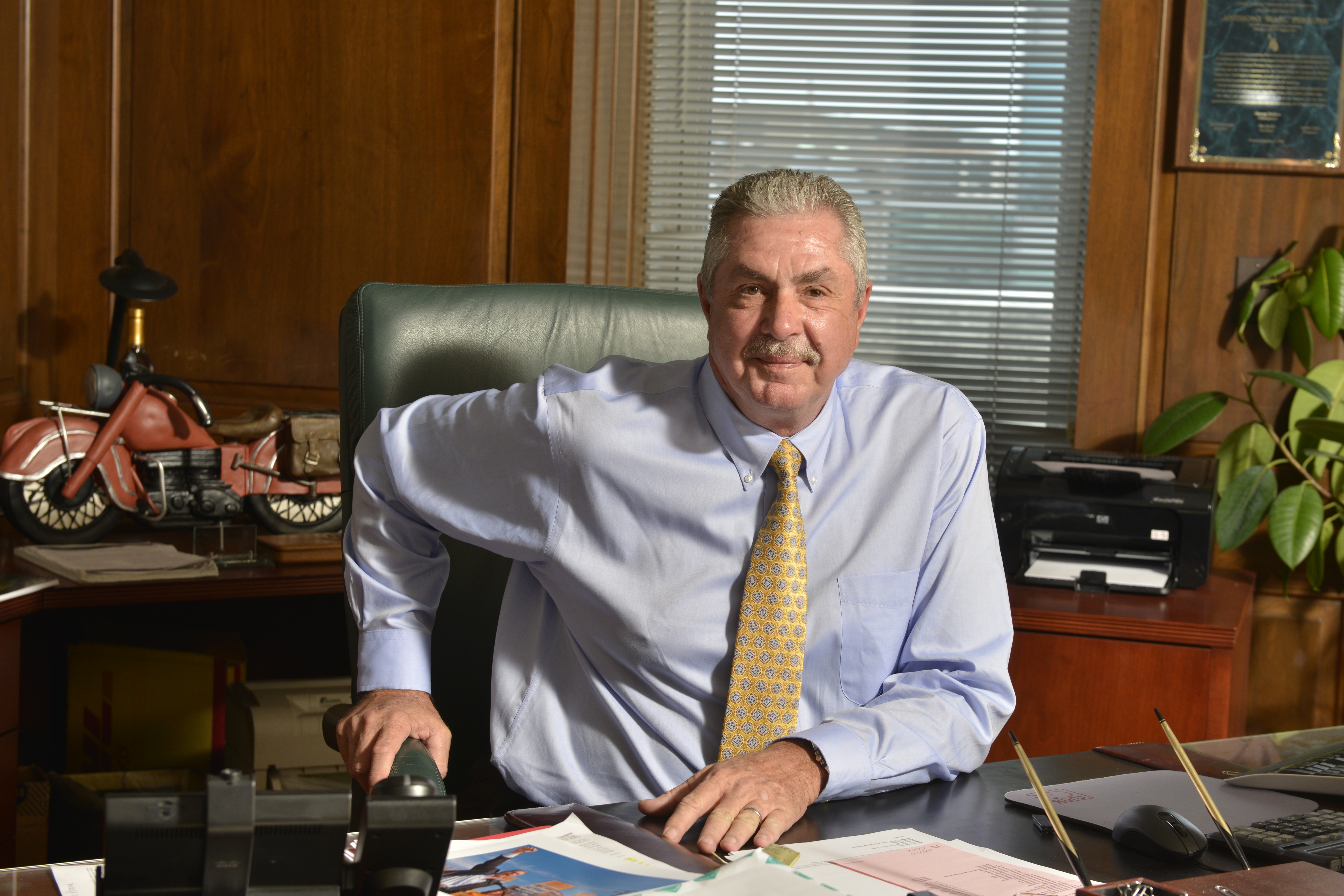 This Labor Day weekend, Jobs with Justice has launched a series of stories called The Way They Worked to collect and share stories from people in the labor movement about how their grandparents worked, and what they learned from them. We sat down with our own UFCW International Secretary-Treasurer Marc Perrone to hear about his grandfather Joe and grandmother Gaetana:
This Labor Day weekend, Jobs with Justice has launched a series of stories called The Way They Worked to collect and share stories from people in the labor movement about how their grandparents worked, and what they learned from them. We sat down with our own UFCW International Secretary-Treasurer Marc Perrone to hear about his grandfather Joe and grandmother Gaetana:
My grandmother arrived in America through the port of New Orleans and my grandfather through Ellis Island, both immigrating from Italy.
Before my grandmother Gaetana met her future husband Joe, she stayed for a while in Louisiana among other Italian immigrants, and her brother worked in the cane fields. Unfortunately, Gaetana’s brother died while working out in the fields one day. The people who employed Gaetana’s brother never notified his family, and buried him in an unmarked grave.
This sad occurrence was just one example of the experiences many immigrant families faced in those times.
Eventually, both of my grandparents and their families moved to Texas where they became sharecroppers and farmers. Joe and Gaetana eventually met and married.
As immigrants, my grandparents and their families experienced a good deal of discrimination. They would always tell me a story, and it has really stuck with me all these years. Before they were sharecroppers, my grandfather and his younger brother had heard that the railroad company was laying track and that there were jobs to clear the land. They walked over to the job-site but were told that since they did not own any tools, they couldn’t get the job. So, my grandfather and his brother walked into town and went to a hardware store. They didn’t have any money, but they talked to the store owner to work out a deal where they could each buy an axe on credit so they could work. Finally, the store owner agreed to the deal and gave them the axes on the condition they pay him back. The brothers then returned to the job-site to talk to the foreman about hiring them, since they now owned the appropriate equipment. However, the foremen simply told them, “we don’t hire Italians here.”
The brothers protested, saying they had been told if they got the tools they could work, but the answer was the same. The brothers were forced to return to the hardware store and return the unused axes, but the store owner refused to take them back, leaving the brothers in debt to him, with no foreseeable way for them to pay him back.
My grandmother Gaetana also had been teased so much about her Italian name in school that she changed her name to Agnes, and was harassed so badly for being an immigrant that she dropped out of school and never learned to read or write.
Despite these hardships, my grandparents worked very hard as sharecroppers and were eventually able to scrape enough money together to buy a plot of land, which they farmed, raising cattle and other farm products. They were up at 5:00 every morning and out the door, checking on the animals, plowing the fields, baling hay, and keeping things going.
The main thing I learned from my grandparents was that if you wanted something in life, you had to work really hard to get it. But if you did that, and respected people, then good things would come to you–and that you could in fact make it, even if you started with nothing.
The other thing I learned, was just how important family was. In addition to working hard on the farm and garden, my grandmother always made sure we had a big traditional Italian Sunday dinner, with home-made spaghetti sauce. And my grandfather always told me, no matter what it was about, I could always come to my family with a problem or if I needed help.
Seeing discrimination and experiencing it themselves, my grandparents were believers in respecting people–treating them fairly and decently, and that had a big impact on me. For many people, families are often your only support system. Today, so many people come to America for a better life, and have to find work and face all kinds of barriers, including discrimination. Many come all by themselves, and their families are far, far away. In these situations, who becomes your support system when you are treated unfairly at work? When workers stick together, that support system is each other. When you are going through the same experiences, or living in worker housing together, people learn to rely on each other and work together to make things better. I think that’s a big part of why I started getting involved in the union.
America’s economy benefits from the hard work and contributions from immigrants, but they are often taken advantage of, discriminated against, or left vulnerable by a lack of protections in the workplace. Both in the days of my grandparents, and today, employers try to drive apart immigrants from different countries or races, or pit them against each other, so that it is harder for them to unite in dealing with issues in the workplace. But when workers stand together they have the power to change things that aren’t right, and even the playing field.
That’s why, as a union, we try to help immigrants however we can–whether it’s creating a path to citizenship, or bargaining for important workplace protections. Your union is truly your family when your support system is far away, and even if it isn’t. When my father died, I had been working for our union, the UFCW, for 33 years. I was walking out of the church from his funeral, and saw the former director who had hired me to work at UFCW coming in. He was over eighty years old, had been retired for 20 years, and had traveled over 100 miles to be there. That really demonstrated to me how union people are your family.
Whether someone is an immigrant or not, unions are avenues and vehicles for people to improve their lives. They are made up of groups of people that provide physical and psychological support, and can be the difference in feeling like you are powerless to change something, to feeling empowered to make a difference.
Tell us about your grandparents’ work story! Send submissions to Submissions@ufcw.org, post on our facebook page, or fill out an online form here.
August 29, 2014
This Labor Day UFCW and The Leukemia & Lymphoma Society Celebrate Their Partnership to End Blood Cancer
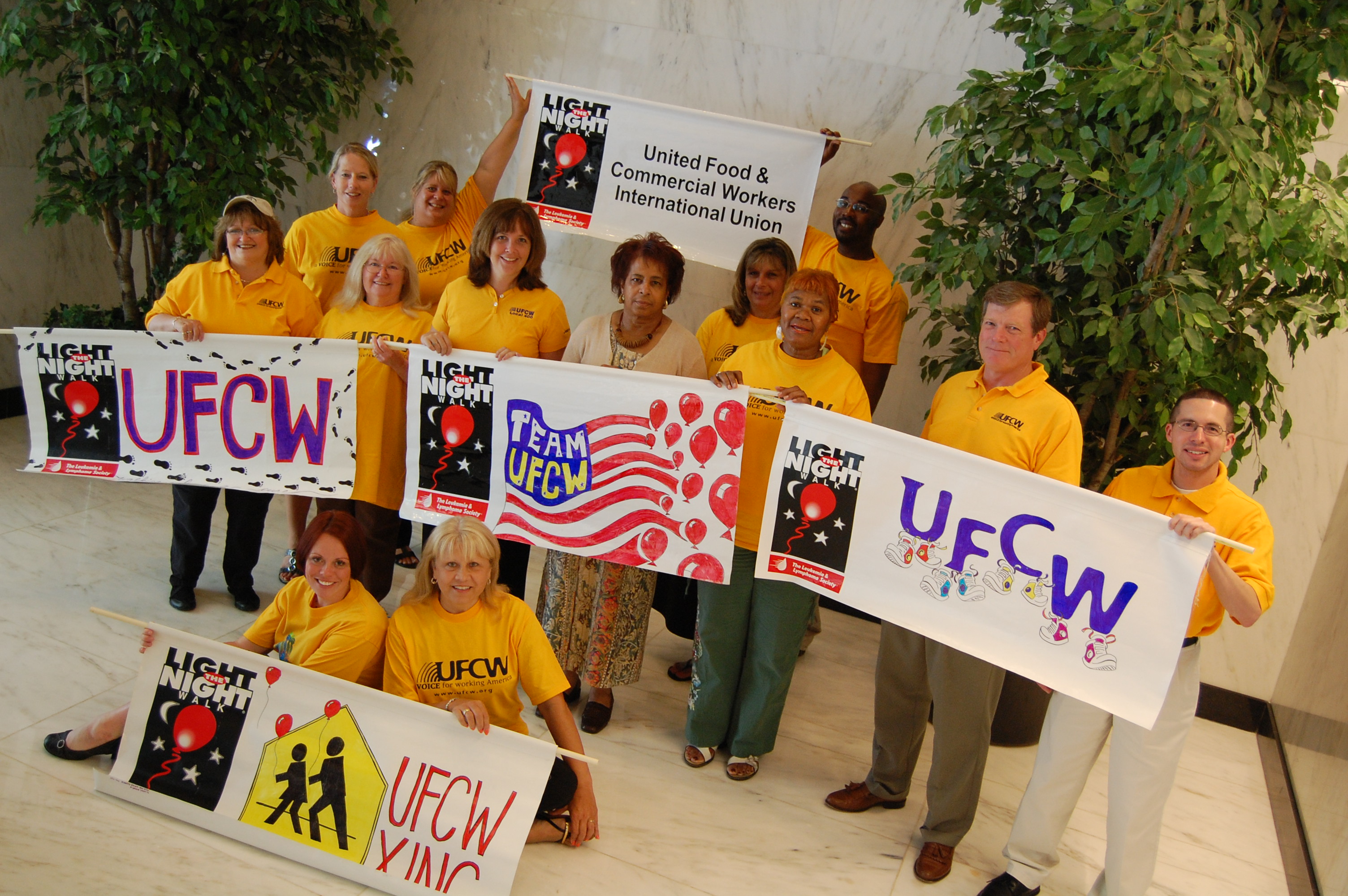 Shortly after Labor Day, September 6th will mark the beginning of Blood Cancer Awareness month–and is a reminder to us why the partnership between the UFCW and the Leukemia & Lymphoma Society (LLS) is so important.
Shortly after Labor Day, September 6th will mark the beginning of Blood Cancer Awareness month–and is a reminder to us why the partnership between the UFCW and the Leukemia & Lymphoma Society (LLS) is so important.
Working together since 1983, the UFCW has helped raise over $60 million dollars for LLS through charity golf tournaments, auctions, bottle drives and a range of other events, all of which has gone towards the development of lifesaving drugs and working toward the shared goal of a world without blood cancers and achieving their mission to cure leukemia, lymphoma, Hodgkin’s disease and myeloma. Many UFCW staff, local union leadership, and rank and file members also greatly enjoy participating in the LLS Light the Night walk, as well as the Team in Training campaign.
Together in this special partnership, LLS and UFCW are truly helping blood cancer patients live better, longer lives.
For blood cancer awareness month, the LLS is attempting to raise $300,000 in 30 days. Please consider helping us get them to their goal by donating today. You can find free information and more info about support services and the LLS’s lifesaving blood cancer research around the world by going to http://www.lls.org/.
August 28, 2014
UFCW Statement on Market Basket Sale
 WASHINGTON, D.C. – Joe Hansen, International President of the UFCW, Richard Charette, UFCW International Vice President and President of UFCW Local 1445, and Dave Fleming, President of UFCW Local 328, today released the following joint statement in response to the sale of Market Basket.
WASHINGTON, D.C. – Joe Hansen, International President of the UFCW, Richard Charette, UFCW International Vice President and President of UFCW Local 1445, and Dave Fleming, President of UFCW Local 328, today released the following joint statement in response to the sale of Market Basket.
“Market Basket workers have secured the return of their preferred corporate leader by standing together in unprecedented collective actions. These workers showed that the real value of any company is not held in stocks, but in the dedication and hard work of its workforce.
“Market Basket workers and their families have made tremendous sacrifices, and proved that when they stand together, they have the power to move mountains.
“The members of our union have stood in solidarity with Market Basket workers, from rallies to raising a solidarity fund to help laid-off workers. As Market Basket workers negotiate the terms of their return to work, we will continue to offer our solidarity and our support.”
###
The United Food and Commercial Workers International Union (UFCW) represents more than 1.3 million workers, primarily in the retail and meatpacking, food processing and poultry industries. The UFCW protects the rights of workers and strengthens America’s middle class by fighting for health care reform, living wages, retirement security, safe working conditions and the right to unionize so that working men and women and their families can realize the American Dream. For more information about the UFCW’s effort to protect workers’ rights and strengthen America’s middle class, visit www.ufcw.org, or join our online community at www.facebook.com/UFCWinternational and www.twitter.com/ufcw.


